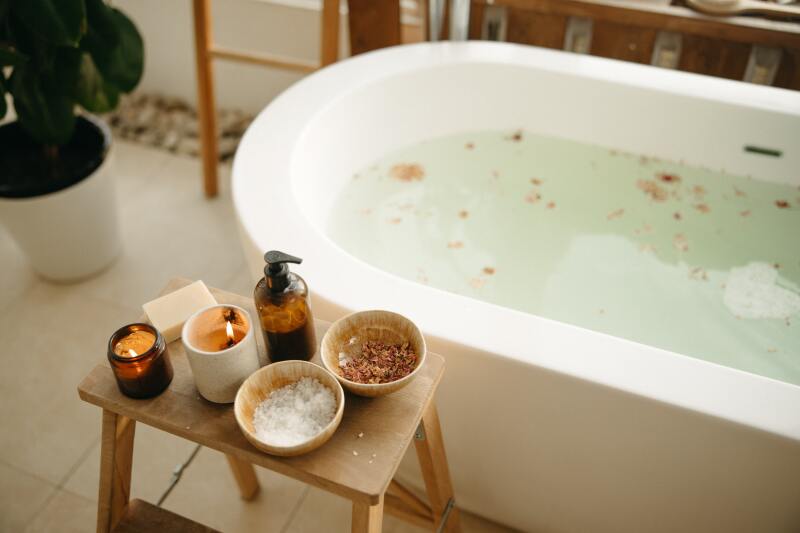Nighttime baths are a routine for kids, but they may be the key to helping adults sleep better, too.
“Baths are my decompression time,” says Laura Loyacono, a bath enthusiast who grew up in a small home where a bathtub was the only option for getting clean at night. “It’s the demarcation between my workday and sleep.”
If the line between work, life, and sleep are starting to blur, try taking a bath as a reminder that good boundaries are about what you do for you.
Baths have shown to be a respite from the pressures of daily life and to improve sleep. Small studies in Germany and Japan suggest that regularly immersing in baths over time can help combat depression symptoms and lower tension anxiety.
Baths help Loyacono, who suffers from insomnia, make the mental shift from her work as a university administrator to focusing on herself at home. Her phone goes away. She sprinkles Epsom salts in the hot water. And then she simply sits and soaks.
“The bath is forced relaxation,” Loyacono says. “I can’t think of anything more decadent than taking a bath by yourself. A good bath is a dimmer switch that helps my brain calm down. I power down while I soak."
What Are the Benefits of a Bath Before Bed?
A bath can feel great in many ways. According to a small study in Japan, participants reported feeling significantly improved mental, emotional, and social health after bathing in warm water over a two-week stretch.
Other reported benefits of a bath include:
- stress and anxiety relief
- muscle and pain relief
- lower blood pressure and cardiovascular risk
- increased metabolism
- diabetes management
- immune system boost
But how long you take a bath and at what temperature matters. Keep reading to figure out what bath ritual works best for you.
How Does a Warm Bath Help You Sleep?
According to Dr. Barbara Kubicka, author and co-founder of The Bath Project, the hot water in your bath can ease tension and help reduce stress. “By increasing your body’s temperature, our muscles relax, and blood pressure goes down,” Kubicka says.
As you soak in the tub, the warm water increases your circulation and draws heat from the core of your body to your fingers and toes. Then, when you step out of the bath, your body cools in the air. It’s this temperature drop that mimics one of the many cues our body uses to wind down.
When you’re awake, your core body temperature is the highest, often in the late afternoon or early evening. This is part of your body’s circadian rhythms, a set of behaviors and biochemistry timed to an internal 24-hour clock with a wake and sleep cycle. What triggers your sleep cycle is the natural decrease of body temperature, by roughly a degree, an hour before bedtime.
“Taking a warm bath at night augments the natural drop in body temperature at this time and helps make you sleepier,” says Shahab Haghayegh, a postdoctoral fellow at the Harvard T.H. Chan School of Public Health, and researcher behind a meta-analysis of before-bedtime body heating.
His research found that people who took baths an hour or two before bedtime, at 100 to 104 degrees Fahrenheit, shortened the time it took to fall asleep by about 10 minutes.
If you aren’t sure what that feels like, Dr. Lynelle Schneeberg, a sleep psychologist and fellow with the American Academy of Sleep Medicine, advises that your bath water should be roughly the same as a hot tub, what Schneeberg describes as “comfortable, but warmer than your body temperature.”
What's the Best Way to Take a Warm Bath for Better Sleep?
Don’t stress about not having enough time to bathe.
The participants in the study in Japan reported benefits after just 10 minutes of bathing, and other studies report benefits from soaks of anywhere from 10 to 90 minutes. Our recommendation is to aim for a sweet spot of around 20 to 25 minutes, as shorter might not give you time to unwind, but a longer one could start to dry out your skin.
Take a bath roughly one to two hours before you’re planning to go to bed — and if you apply body lotions or oils before you sleep, remember to let your skin dry before crawling between your sheets.
“Bathing is an opportunity to experience something different every time,” Kubicka says. “I love how my skin feels after a soak and how relaxed I feel after just 20 minutes of bathing.”
How to Enhance Your Bath Experience
While a warm bath can boost your body’s natural sleep patterns, it’s also an opportunity to shut out the world and give yourself a bit of tranquility. As your senses stay occupied, it may be easier to disconnect from the stress you’ve built up over the course of a day. Soothing music, comforting scents, and bath salts or oils are all therapeutic ways to engage all your senses. Loyacono also recommends removing screens while you wait for the bath to get good and hot.
Kubicka is partial to a combination of lavender, mandarin, and clary sage essential oils. “With this combination, flower aroma calms down emotions, fruit helps with stimulation of positive thoughts, and plants soothe the body,” Kubicka says.
She suggests three to nine drops of essential oil in the bath, which should be enough to provide fragrance without causing skin irritation. If those scents don’t jive with your nose, choose scents you do like. “Our body usually gives us an indication of what we need. Choose oil you like and are attracted to,” Kubicka advises.
For those looking to make your skin softer or reduce irritation, Kubicka recommends Epsom salt or magnesium flakes. You’ll want to use at least two cups of Epsom salt for a full 20-minute soak. Massage lotion or a body oil on your skin afterwards while your skin is still damp to lock in the moisture.
Think about how you want the water to feel as well. You can change the color of the water with bath bombs that contain natural pigments. Coconut or argan oils, which help soften and moisturize the skin, will also thicken the texture of the water. If using oils, consider a bath mat to avoid slipping, as your feet will be slick.
“You want your bath to be a real sanctuary,” says Schneeberg, who recommends creating a relaxation routine before bed. This could involve sleep music or guided meditations under dimmed lights. If you can’t dim the lights, consider bathing by candlelight.
Treat Your Loved One to a Bath
Baths don’t have to be only for yourself either. Nothing says “Don’t worry, I’ll take care of everything,” like drawing a warm bath for a stressed-out loved one. If you already know their favorite scents or relaxation music, prime the bath for a perfectly personalized soak. It’s a great, easy way to help them prioritize evening self-care.
As an added luxury, set a robe and slippers nearby and toss towels in the dryer, so they’re at their toastiest.
What If I Don’t Have a Bathtub?
If you can’t slip into a bath, you can still recreate aspects of your relaxation routine in the shower.
Loyacono lets a shower warm up before stepping inside and then moves under the shower head to focus on wherever she is experiencing stress or muscle aches like the lower back. If this sounds relaxing, high-pressure shower heads might be a good investment.
There are also products like shower steamers, which are cubes are designed to release essential oils as your shower heats up.
Keep Calm and Sleep On
Between your bath and bedtime, those minutes (or hours) should belong to you. Remember to take care of your chores and clean your bedroom before getting into the bath. Seeing clutter before you go to bed may trigger thoughts of a to-do list and undo the sleepy energy you manifested for yourself. If decluttering and organizing your bedroom feels like a weekend task, then, at minimum, remove anything that reminds you of work or chores.
Schneeberg also recommends taking a visual cue from hotel rooms. “So many people sleep well in hotel rooms because it’s a room that’s been arranged for your comfort and serenity through the literal taking away of stressors,” Schneeberg says.
You can also bring in scents that help remind you it’s time for sleep via essential oils in a diffuser. If you don’t have a diffuser, Schneeberg suggests a quick spritz of a favorite scent on your pillowcase.
“Scents can cue drowsiness,” Schneeberg says. She recommends choosing a specific scent only for your bedtime routine. “Then, every time you smell the scent you like, it reminds you that it’s time for bed.”
Still need a little extra boost for bedtime? Try box breathing or music for sleep. There are also natural remedies to help you sleep, such as magnesium and melatonin. Or if you like tea before bed, may we recommend a soothing cup of chamomile?
☾
If you found this article helpful, consider sharing it on Twitter, Facebook, Pinterest, or Instagram or emailing it to any friends or family members who might benefit from a better night’s sleep. Sharing is caring!







